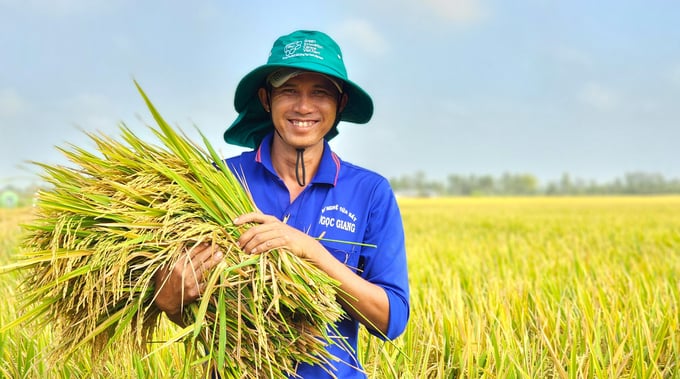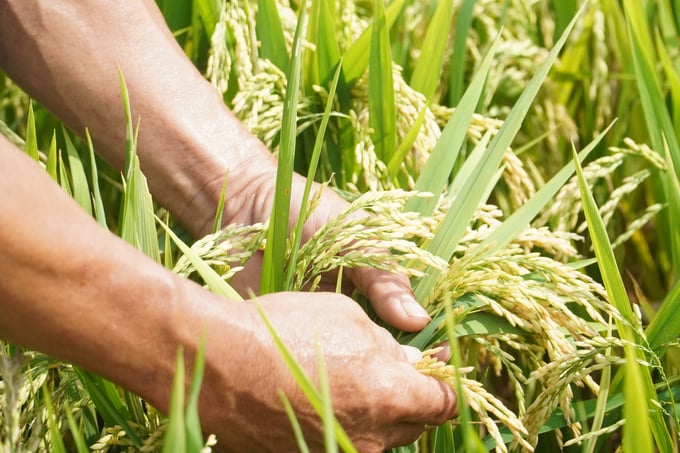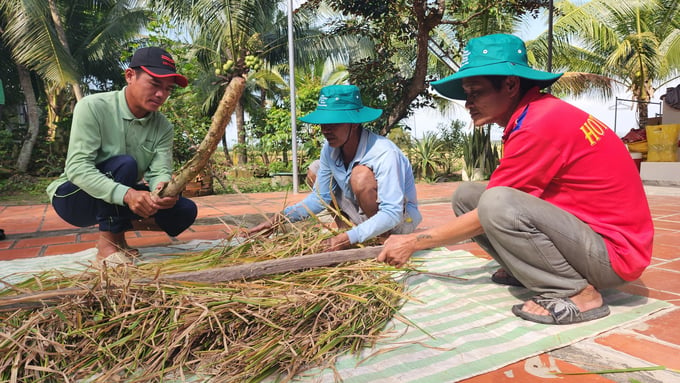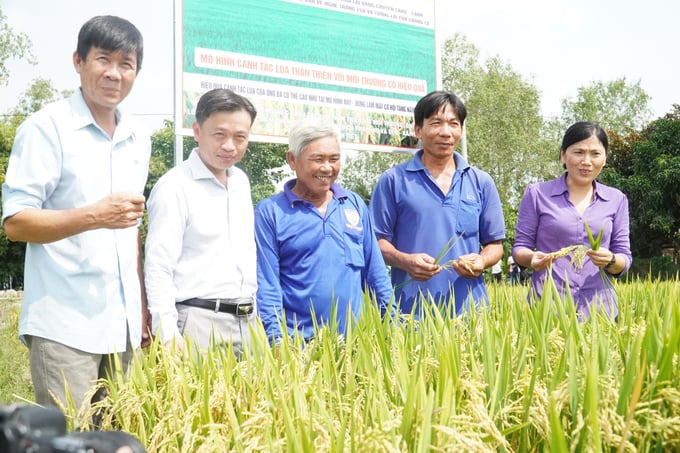June 17, 2025 | 20:22 GMT +7
June 17, 2025 | 20:22 GMT +7
Hotline: 0913.378.918
June 17, 2025 | 20:22 GMT +7
Hotline: 0913.378.918
Rice is one of Vietnam’s most important agricultural commodities, but it is also responsible for 48% of the agricultural sector's greenhouse gas emissions and more than 75% of methane emissions every year, equivalent to approximately 49.6 million tons of CO2e.

The Vietnam Sustainable Agriculture Transformation (VnSAT) Project has piloted advanced technical solutions and successfully implemented them on 184,000 ha of rice in the Mekong Delta. Photo: Kim Anh.
Based on conservative estimates from the World Bank, improving water management and optimizing the use of inputs such as seeds, fertilizers and pesticides can help farmers maintain or even increase yields from 5 to 10%. Applying appropriate rice production methods can reduce input costs by 20-30%, thereby increasing profits by approximately 25%. More importantly, technical improvements will help cut greenhouse gas emissions by up to 30%.
In 2013 the Ministry of Agriculture and Rural Development issued Decision 935 approving the outline of the task of building rice farming models. The focus is to reduce greenhouse gas emissions through water-saving irrigation techniques. The Ministry of Agriculture and Rural Development assigned Thuyloi University to develop and monitor farming models in two selected areas, including the "big paddy” model in Soc Trang province. Following that, a series of pilot programs, projects and models of rice cultivation to reduce greenhouse gas emissions in Vietnam were simultaneously implemented.

Rice production under a low-carbon process helps farmers produce with higher efficiency, increasing profits by approximately VND 5 million/ha compared to the traditional method. Photo: Kim Anh.
Within the framework of the VnSAT project funded by the World Bank and implemented from 2015 to 2022, advanced technical solutions have been piloted and implemented successfully on over 184,000 ha of rice in the Mekong Delta.
The project has supported more than 240,000 farmers to apply the wet - dry alternating irrigation method and the “1 must, 5 decreases” approach. Rice farmers have reduced input costs and post-harvest losses by 20-30%, increased rice yield by 3-4%, and increased selling prices by 5 - 10%. After calculation, the overall profit is increased by approximately 28%. Assessment results from the World Bank show that the VnSAT project has helped reduce greenhouse gas emissions by nearly 1.5 million tons of CO2e.
With a total investment of 7 million euros from the German government, the project of the Green Innovation Center (GIC) implemented from 2021 to 2024 is being participated with great enthusiasm by cooperatives in six localities in the Mekong Delta region, including An Giang, Dong Thap, Can Tho, Hau Giang, Kien Giang and Soc Trang.

Farmers taking rice samples to evaluate the effectiveness of low-carbon rice farming models. Photo: Van Vu.
In Can Tho city, the project has implemented three demonstration models of low-carbon rice production and greenhouse gas emissions reduction in two districts of Thoi Lai and Vinh Thanh, on a total area of 15 ha. The models are implemented according to the Sustainable Rice Platform (SRP) standards, using active irrigation methods, managing water according to the wet - dry alternating irrigation method, and proactively collecting straw.
Thuan Thang Agricultural Cooperative (Dong Thuan commune, Thoi Lai district) is one of the cooperatives participating in low-carbon rice production. Mr. Duong Van Sieu, Deputy Director of the cooperative, said that in the 2022-2023 winter-spring crop, the cooperative’s rice yield reached 8-10 tons/ha. Production costs decreased by approximately 50% compared to the previous winter-spring crop, leading to an increase in profit of approximately VND 5.6 million/ha.

Eco-friendly and emission-reducing rice production models are being deployed strongly in Can Tho City. Photo: Van Vu.
Nguyen Tan Nhon, Head of the GIC Project Management Board in Can Tho city, assessed that low-carbon rice production models guide farmers in the area to convert from cultivating three rice crops per year to producing only two rice crops per year while intercropping another crop of other vegetables.
Through sampling and determining rice output in the 2022-2023 winter-spring crop, Can Tho’s agriculture sector revealed that low-carbon rice production models have contributed to reducing 25% of the greenhouse gas emissions rate. As a result, the city's agricultural industry will continue to replicate six more models in key rice-producing districts in 2023.
Statistics from the GIC Project Management Board in Vietnam show that the project is conducting training on SRP (low carbon, emission reduction), Organic, MRL/IPM techniques for nearly 11,000 farming households at 44 pilot models in the six implementing provinces.
The fourth Global Conference of the Sustainable Food Systems Programme is scheduled to be held from April 24 to 28 in Hanoi. The event receives attention from many ministers, deputy ministers, and heads of sectors from countries and international organizations.
The 4th global conference of the Sustainable Food Systems Programme will contribute to the 2023 Stocktaking Moment of the UN Food Systems Summit follow-up process by focusing on how food systems need to be transformed to overcome the multiple deeply rooted and interlinked crises of climate, biodiversity, conflict, energy, prices, hunger, malnutrition, and health to achieve the sustainable development goals (SDGs).
As the host country of the fourth conference, Vietnam will have the opportunity to share with other countries, United Nations organizations and international organizations about the efforts, results and the process of Vietnam's food system transformation.
The opening session is scheduled to be held on the morning of April 24, followed by thematic sessions. The SFS Program's closing meeting and the Multi-Stakeholder Advisory Committee (MAC) are scheduled to be held on the afternoon of April 27 and the morning of April 28.
For more information, please visit the links below:
https://www.oneplanetnetwork.org/programmes/sustainable-food-systems/4thconference
https://nongnghiepmoitruong.vn/hoi-nghi-toan-cau-he-thong-lttp-channel46/
Translated by Samuel Pham

(VAN) The UNESCO Global Geopark revalidation of Non nuoc Cao Bang and the transition to a two-tier administrative model are presently undergoing a pivotal moment in Cao Bang, the northernmost province of Vietnam.
/2025/06/13/5330-2-004539_953.jpg)
(VAN) Changing policy mindset and removing investment barriers are urgent requirements to open up new development space for enterprises in the agricultural sector.

(VAN) The areas include the restoration of five million hectares of marine ecosystems.

(VAN) Dr. Le Van Nguyen, Director of the Institute of E-Commerce Management (ECM), emphasizes the potential for green development through the cultivation of fruit trees, particularly in provinces such as Son La.

(VAN) VAAS and numerous Vietnamese enterprises have signed cooperation agreements with Japanese partners to promote agricultural technology and trade connectivity.
/2025/05/29/5625-12-214801_567.jpg)
(VAN) Provincial mergers in the Mekong Delta promise to streamline administration, expand inter-provincial raw material areas, and foster close linkages in agricultural value chains, benefiting both businesses and cooperatives.

(VAN) Merging Mekong Delta provinces contributes to the expansion of agricultural raw material areas, addressing previous constraints caused by provincial boundaries. Additionally, this expansion will reduce costs and strengthen linkages between businesses, cooperatives, and farmers.